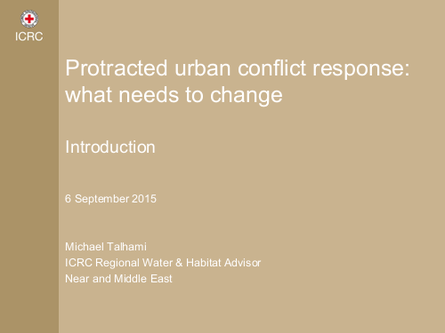
Protracted armed conflicts are affecting millions of people living in urban areas, and decades of violence pose a challenge to urban services and infrastructure. City dwellers living through these crises are increasingly vulnerable to the shortcomings of conventional humanitarian and development approaches.
With decades of operational experience addressing the challenges of water, sanitation, electricity, solid waste and other public services throughout protracted urban wars, the International Committee of the Red Cross (ICRC) has found that the underlying causes of those challenges do not currently receive the attention they deserve – and even their symptoms are difficult to deal with through short-term emergency responses. In a new report, ICRC call for humanitarian and development actors to change the course of their response in order to better respond to these crises.
This launch event, hosted by ALNAP's Urban Humanitarian Response Community of Practice, was for a new ICRC paper that brought together experts from both the development and humanitarian sectors to discuss the main findings of the ICRC report.
Resource collections
- Evaluating humanitarian action
- UN Habitat - Urban Response Collection
- Urban Response - Urban Crisis Preparedness and Risk Reduction
- Urban Response Collection - Community Engagement and Social Cohesion
- Urban Response Collection - Economic Recovery
- Urban Response Collection - Environment and Climate Change
- Urban Response Collection - Housing, Land and Property
- Urban Response Collection - Urban Crisis Response, Recovery and Reconstruction
- Urban Response Collection - Urban Resilience
